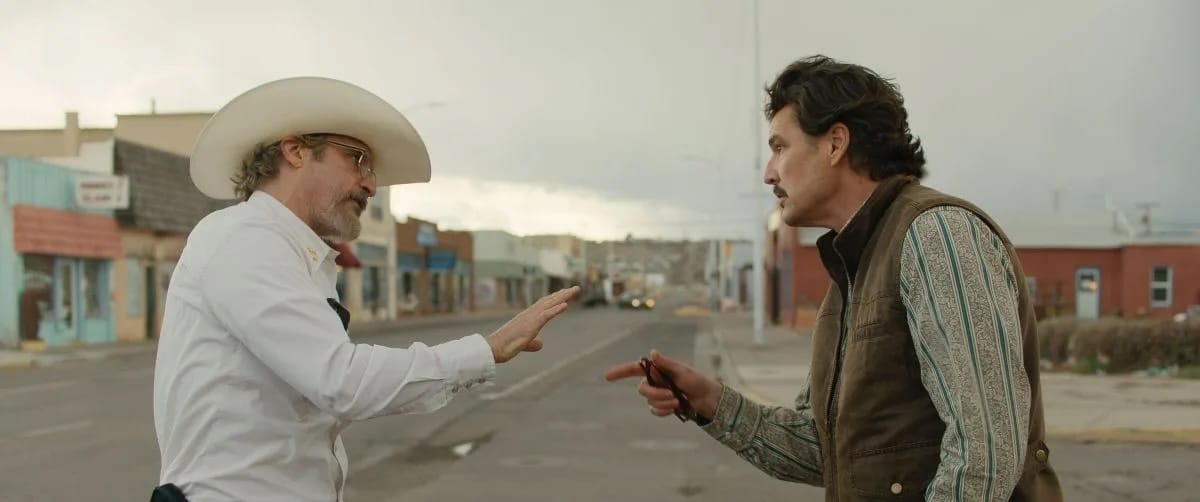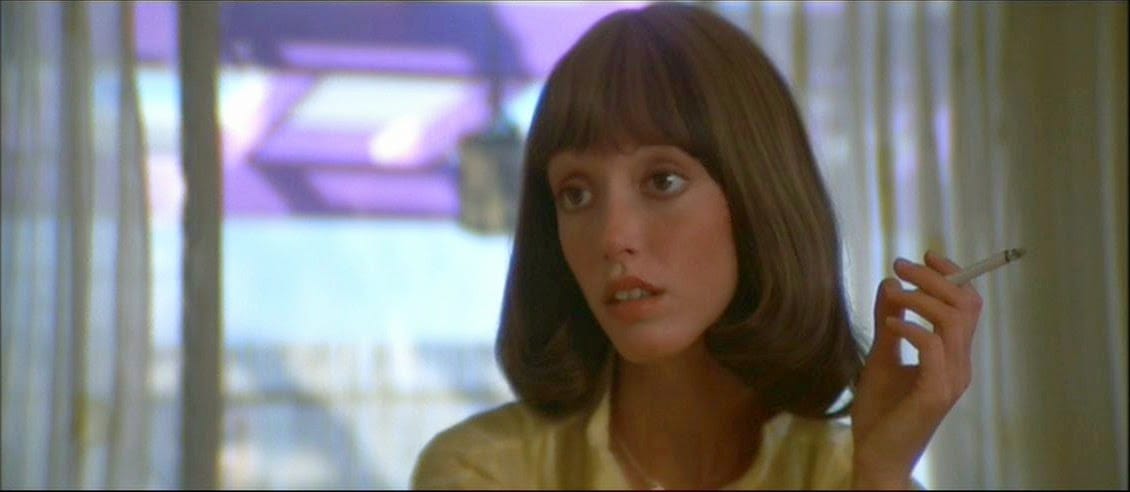#63: Did I like Eddington or hate Eddington? Yep!
Death By Consumption
7/15/25 - 7/21/25
I guess summer in New York is now just going to be 100 degrees most days, forever? Every day, my phone alerts me that a heatwave is in effect until, say, 8pm on Tuesday, and then at 9pm on Tuesday it alerts me that a new, different heatwave is starting. But wasn’t that hour between heatwaves just lovely? It's all a nice reminder that we're not just living through the season finale of America, we're living through the season finale of Earth! And I don't think we're getting renewed :(
This week, between working my ass off for ONCE: I was and still am torn on my feelings about Eddington, I was charmed by a classic film about three freaky women, and I read a Survivor winner's new memoir and a pretentious Russian book I fucking hated.
Eddington (2025) — at Nitehawk Prospect Park
I originally wrote an entire review of Eddington that was like: here are all the reasons why I hated Eddington. But by the end I was like… wait, did I just talk myself into liking Eddington? I still don’t know how I feel. So I've scrapped everything I wrote, and let’s see if I can figure out my true feelings about the film now! As one of the people most responsible for everything that happens in Eddington once said: fuck it, we'll do it live.
First, I'll get my complaints out of the way: it’s too long (I am 75 years old). Reliving the horrors of living in America in 2020 is one thing, but reliving them for nearly 3 hours? Brutal! (This is partly my fault, because we sat down for a 9:30pm screening, a near-fatal error. Not naming names, but someone whose name rhymes with "Dustin" was annoyed at all the audience laughter in the first half of the film, because it was interrupting his nap.)
Another complaint I have — and it's probably the big one — is that the film doesn't have much to say. It's mostly Ari Aster putting a satirized and extreme version of 2020 on screen and then gesturing at it like, "Pretty crazy, huh?" Yes, it was pretty crazy! Unless you're a literal 4-year-old, everyone seeing this movie lived it! We know it was crazy! Care to add anything else?
This is not to say that I need Eddington to moralize, or to "choose a side." I've seen a lot of arguing online about whether Eddington is "on the left" or "on the right," or who it's skewering, or whether it's skewering anyone at all. I've seen comparisons to Alex Garland's Civil War — which made the extremely cowardly decision to not ever get into the politics of its civil war — but that comparison seems willfully stupid. Eddington is very clear on its characters' politics, and it is very happy to ridicule them. The first half is genuinely hilarious, with some of the sharpest satire I've seen about this psychotic neverending moment we're all living through. (He somehow found new, actually funny jokes about white liberals ostentatiously reading Black authors during the summer of 2020! Who knew there was any humor left to mine from that era!) And anyone saying Ari Aster is "playing both sides" must not have paid attention to... the entire back half of the movie? Most of the discourse I've seen is basically another form of this:
![A screenshot of an iconic tweet that reads: Is [pop star] a feminist? is MasterCard a queer ally? is this tv show my friend?](https://www.deathbyconsumption.com/content/images/2025/07/pop-star-feminist.jpeg)
But beyond that, I never care if a movie picks a side! I think anyone who needs a movie to lay out its morals (or, even worse, need a movie to have the exact same morals as they do) should have never been allowed to progress beyond Dr. Seuss. Grow up! But what I do need is for a film to have something, anything, to say — and, "Man, everyone in America went nuts in 2020!" isn't enough.
Longtime readers of this newsletter know I've been on the "everyone is insane" beat for a long time now. And this movie gets right at the core of when and why that happened: the pandemic shattered societal bonds, the confusing and leaderless government response to it destroyed the last sense of there being "experts" in charge of anything, the George Floyd protests made white people freak the fuck out, and then a bunch of con artists on the internet took advantage of the chaos to make a lot of money while driving all their followers insane. So in some respects, seeing that story play out on screen — in a tidy little narrative package that starts with dark humor and ends with heads exploding — is a worthy cause. The first step to a cure is diagnosis!
But there are moments where it does feel like the film is copping out from really saying anything. It's not a "both sides are bad" film, necessarily, but there are moments that feel very much like a college stoner who thinks he's the smartest guy in the room when he says, "What if the left is crazy too, man?" There were a few scenes in which I could practically feel the producers just out of frame, high-fiving with eager anticipation of all the discourse they were about to create. But I'm not sure there's much discourse to be had (he says, 1,000+ words in), beyond the boring back-and-forth about which side Ari Aster is on. There are no new ideas in here, no alternate ways of thinking you probably haven't already considered, and far too many narratives that just kind of happen (justice for Emma Stone and Austin Butler's plots! literally what was the point.............). And yet: I'm glad I watched it? And hope more people see it? I don't know!

If it feels like I've been hemming and hawing — or, to use a phrase still politically traumatizing to anyone who was voting age in 2004: flip-flopping — on my feelings as I write this, it's because I am! I was genuinely entertained throughout most of the film: I laughed, I gasped, etc. etc. But when I walked out, I felt... nothing. And I discovered I had very little to say, other than, "Wow, that was crazy."
But days later, I keep mentally returning to the film — how darkly accurate the jokes were, how plausible the violence is. Maybe the real problem with Eddington is on me, for expecting Ari Aster to have more to say about a crisis that is very much still playing out, or for looking for neat answers about a rapidly metastasizing disease. Maybe the only real thing to be done by an artist at this time is to put this moment in our country's history on screen and say: isn't this fucking crazy???
3 Women (1977) — on Criterion
I love that Robert Altman just wanted to make a movie about the three kookiest women he could think of. More movies should explore the idea "what if women were weird?" Supposedly inspired by a dream he had, 3 Women unfolds with dream logic, as the three titular women shift or even trade personalities without warning. I felt destabilized and confused throughout most of it, and yet I loved it, mostly due to Sissy Spacek acting like a freak from beginning to end, and Shelley Duvall proving she was secretly one of the funniest actresses of all time.

The plot is nearly indescribable — Sissy Spacek is a childish weirdo who becomes obsessed with her new coworker, Shelley Duvall (who must have 90% of the film's dialogue, in the form of long, hilarious, rambling monologues about culture and fashion or even just what she had for breakfast that day, often to characters who are actively avoiding listening to her). The third woman, played by Nancy Rule, is mostly silent and pregnant, and spends most of the film painting strange naked creatures onto any surface she can find. The three women are mercurial, hard to pin down, and not even really a trio in any sense until the final 15 minutes or so. And yet, they're all linked, portraying various aspects of womanhood — or possibly portraying a single woman, split into three. The film, with its heavy reliance on psychoanalysis, sexual freedom, and stoner logic, is quite possibly the most 1970s movie of all time. I love these three freaky gals!!!
Nice Girls Don't Win: How I Burned It All Down to Claim My Power, by Parvati Shallow (2025) — hardcover
There was no way I wasn't going to read the first memoir from Parvati, who is not just one of my all-time favorite Survivor players, but one of my all-time favorite reality stars period. But what surprised me was just how much I... related to it? Not that there's much crossover in our lives, other than a shared love of Survivor. But the way Parvati writes about her insecurities — and the ways in which her self-perception and her public perception are often completely at odds — I found strikingly similar to many conversations I've been having with my therapist (which I will not be getting into here, thank you very much). As I read it, I had the thought, for the 5,000th time in my life: if Parvati started a cult, I would be in danger.

The biggest strike against the book is that you can feel the gaping holes that were carved out by CBS's lawyers (truly, with all the PR messes CBS is in right now, how did their lawyers even have time to read this book?). In an interview, Parvati said that shortly before publication, the lawyers came after her, and as a result she had to cut nearly everything about Survivor from the book. We follow her through her original Amazing Race casting process (she was brought in by a friend who worked for the show), only to jump-cut to, like, day 20 on her first season of Survivor. Every single moment she writes about from Survivor is something that aired in an episode — we get word-for-word breakdowns of moments that I've seen 200 times now, with barely any analysis as to what was really going on behind the scenes. The entirety of Survivor: Winners at War, the 40th season that pitted 20 winners against each other, takes up a single paragraph in the book.
And yet, you don't really miss the Survivor stuff! Because that's kind of the point of the book: Parvati is not who she played on Survivor, and this book is just part of her decades-long practice of trying to figure out which parts of the show's "Black Widow" are actually her, and which were a creation of the editors, or the media, or her own youthful naiveté and desire for camera time.
Plus, her life is fucking nuts. Born in a literal cult (hence the white-girl-named-Parvati thing), thrust into stardom and supervillainy and slut-shamed by the world (while losing her little brother to addiction at the same time), giving birth, getting lost in an abusive marriage to another former Survivor, before ultimately discovering her queer identity and being given a second, healthier chance at fame. I know she would probably never do it, but more than once, while reading the insane twists and turns in her life, I thought: Parvati would make such an interesting Real Housewife.
Anyone who follows Parvati outside the show knows that you'll always get a little bit of yoga mindfulness woo-woo from her, so your enjoyment of the memoir will come down to how much description of somatic therapy you can endure. But by the time we've gotten to that section, it felt earned, because I had felt how much she had gone through. (I also had my own moment of horror when I realized, during one emotionally intense period of her life, that I had possibly somewhat contributed to the intensity, when my friend paid her to send me a Cameo offering condolences after my dog died – she was going through so much, and then I had to put my dead dog on her mind as well? Sorry, Parv!)
I have no idea if someone who doesn't know Parvati from TV would get anything from this memoir, but for me, this was just another chapter in nearly 20 years of being absolutely, impossibly charmed by this woman. Parvati, if you're reading this: buy some land out west, start that cult, and I'll be there on day one, burning my Social Security card and pledging my undying allegiance. You are my Mother God.
Blue Lard, by Vladimir Sorokin (1999) — paperback
I mostly finished this book out of spite, because I didn't want to be defeated by it. It's an unpleasant, obnoxious, psychotic read, one that I don't even know how to summarize. It starts in the future (written half in a nearly unreadable hybrid Russian-Chinese slang that leaves you spending half the time in the glossary in the back of the book), in which iconic Russian writers are cloned in order to harvest a mysterious glowing blue substance that forms when they write? And then the "blue lard" is sent back to the past, but an alternate timeline past: one in which the USSR and Nazi Germany have divided up the world. This is a book in which Josef Stalin bottoms for Nikita Khrushchev, and a long-haired Hitler shoots lighting bolts out of his fingers.
It's deeply insane, nearly incomprehensible, and — as the postscript itself proudly points out — impossible to parse. Crazy shit just happens, and I'm sure a lot of Russian lit majors have gotten a lot of obnoxious mileage out of pretending they understand the deeper meanings behind it all, but I'm not bothering with all that. Honestly, it was a perfectly fine book to read last week, when I was swamped with work and working late most nights, because I just needed something to read that would put me to sleep quickly, and wouldn't keep me up eagerly turning pages. I was never happier than when I got to set this book aside and close my eyes.